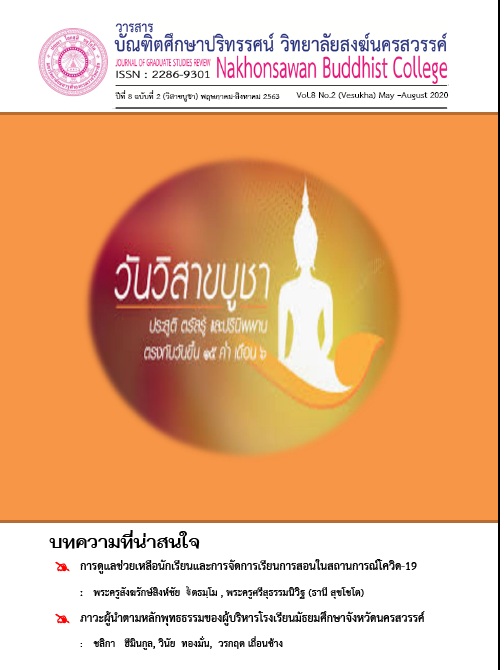การศึกษาสมรรถนะของพระสอนศีลธรรมตามหลักกัลยาณมิตรตามทัศนะของครูและผู้บริหารสถานศึกษา ในโรงเรียนประถมศึกษา จังหวัดอุทัยธานี
Main Article Content
บทคัดย่อ
การวิจัยครั้งนี้ มีวัตถุประสงค์ เพื่อ 1) ศึกษาสภาพสมรรถนะของพระสอนศีลธรรมตามหลักกัลยาณมิตรตามทัศนะของครูและผู้บริหารสถานศึกษา ในโรงเรียนประถมศึกษา จังหวัดอุทัยธานี 2) เปรียบเทียบความคิดเห็นที่มีต่อสมรรถนะของพระสอนศีลธรรมตามหลักกัลยาณมิตรตามทัศนะของครูและผู้บริหารสถานศึกษา ในโรงเรียนประถมศึกษา จังหวัดอุทัยธานี ตามปัจจัยส่วนบุคคล และ 3) ศึกษาปัญหา อุปสรรค และข้อเสนอแนะเกี่ยวกับสมรรถนะของพระสอนศีลธรรมตามหลักกัลยาณมิตรตามทัศนะของครูและผู้บริหารสถานศึกษา ในโรงเรียนประถมศึกษา จังหวัดอุทัยธานี
การวิจัยนี้เป็นการวิจัยเชิงพรรณนา โดยเชิงปริมาณ เก็บรวบรวมข้อมูลจากกลุ่มตัวอย่างที่ครูและผู้บริหารสถานศึกษา จำนวน 254 คน ด้วยวิธีการสุ่มแบบง่าย สถิติวิเคราะห์ คือ ค่าความถี่ ร้อยละ ค่าเฉลี่ย ส่วนเบี่ยงเบนมาตรฐาน และใช้สถิติวิเคราะห์หาค่าที (t-test) การวิเคราะห์ความแปรปรวนทางเดียว ส่วนการวิจัยเชิงคุณภาพ เก็บข้อมูลจากผู้ให้มูลสำคัญ จำนวน 6 รูป/คน แล้ววิเคราะห์ข้อมูลเชิงเนื้อหา
ผลการวิจัย พบว่า
- สภาพสมรรถนะของพระสอนศีลธรรมตามหลักกัลยาณมิตรตามทัศนะของครูและผู้บริหารสถานศึกษา ในโรงเรียนประถมศึกษา จังหวัดอุทัยธานี ทั้ง 4 ด้าน โดยภาพรวม อยู่ในระดับมาก เมื่อพิจารณาเป็นรายด้าน พบว่า ด้านการเรียนการสอน มีค่าเฉลี่ยสูงสุด ส่วนด้านการผลิตและการใช้สื่อ มีค่าเฉลี่ยต่ำสุด
- ผลการเปรียบเทียบความคิดเห็นที่มีต่อสมรรถนะของพระสอนศีลธรรมตามหลักกัลยาณมิตรตามทัศนะของครูและผู้บริหารสถานศึกษา ในโรงเรียนประถมศึกษา จังหวัดอุทัยธานี จำแนกตามปัจจัยส่วนบุคคล โดยรวม และรายด้าน ไม่แตกต่างกัน
- ปัญหา อุปสรรค และข้อเสนอแนะเกี่ยวกับสมรรถนะของพระสอนศีลธรรมตามหลักกัลยาณมิตรตามทัศนะของครูและผู้บริหารสถานศึกษา ในโรงเรียนประถมศึกษา จังหวัดอุทัยธานี ดังนี้
1) ด้านหลักสูตร พบว่า พระสอนศีลธรรมขาดความรู้ ความเข้าใจในการจัดทำหลักสูตรสถานศึกษา ไม่สามารถกำหนดโครงสร้างหลักสูตรได้ตามเป้าประสงค์ที่จะให้ผู้เรียนเป็น ศูนย์กลาง จึงควรวางแผนการทำงานอย่างเป็นระบบ และต้องมีนโยบายในการหาพระที่มีความรู้ความสามารถเข้ามาปฏิบัติงานทุกรูป
2) ด้านการจัดการเรียนการสอน พบว่า พระสอนศีลธรรมยังขาดความรู้ ความสามารถในการเร้าความสนใจในขณะปฏิบัติการสอน ไม่สามารถควบคุมชั้นเรียนได้ดีเท่าที่ควร ขาดการประสานงานระหว่างครูผู้สอนในรายวิชาพระพุทธศาสนา จึงควรสอนแบบผ่อนคลายไม่ควรสอนแต่ธรรม แต่ต้องสอดแทรกความสนุกสนานอย่างอื่นเพื่อดึงดูดความสนใจของนักเรียน ควรมีเทคนิควิธีการสอนที่หลากหลาย เพื่อกระตุ้นให้นักเรียนเกิดความสนใจในการเรียนธรรมมากยิ่งขึ้น
3) ด้านการใช้สื่อการเรียนการสอน พบว่า พระสอนศีลธรรมยังขาดความสามารถในการใช้ห้องปฏิบัติการส่งเสริมการเรียนรู้ ขาดความรู้ในการใช้สื่อ ขาดความสามารถในการใช้แหล่งเรียนรู้ทั้งภายในและภายนอกสถานศึกษา ขาดความรู้ในการใช้เทคโนโลยีในการสอน จึงควรจัดอบรมวิธีการใช้ห้องปฏิบัติการส่งเสริมการเรียนรู้ให้กับพระสอนศีลธรรมด้วย
4) ด้านการวัดผลประเมินผล พบว่า พระสอนศีลธรรมยังขาดความรู้ ความเข้าใจเกี่ยวกับระเบียบการวัดและประเมินผลของสถานศึกษา ขาดความรู้ความเข้าใจในการวิเคราะห์คะแนนการวิเคราะห์ข้อสอบ จึงควรสร้างความรู้ความเข้าใจเกี่ยวกับระเบียบการวัดและประเมินผลของสถานศึกษา และควรมีการประเมินผลการเรียนการสอนอย่างจริงจัง เพื่อจะได้ทราบถึงความสำคัญของการเรียนว่ามี ผลลัพธ์มากน้อยเพียงใด


